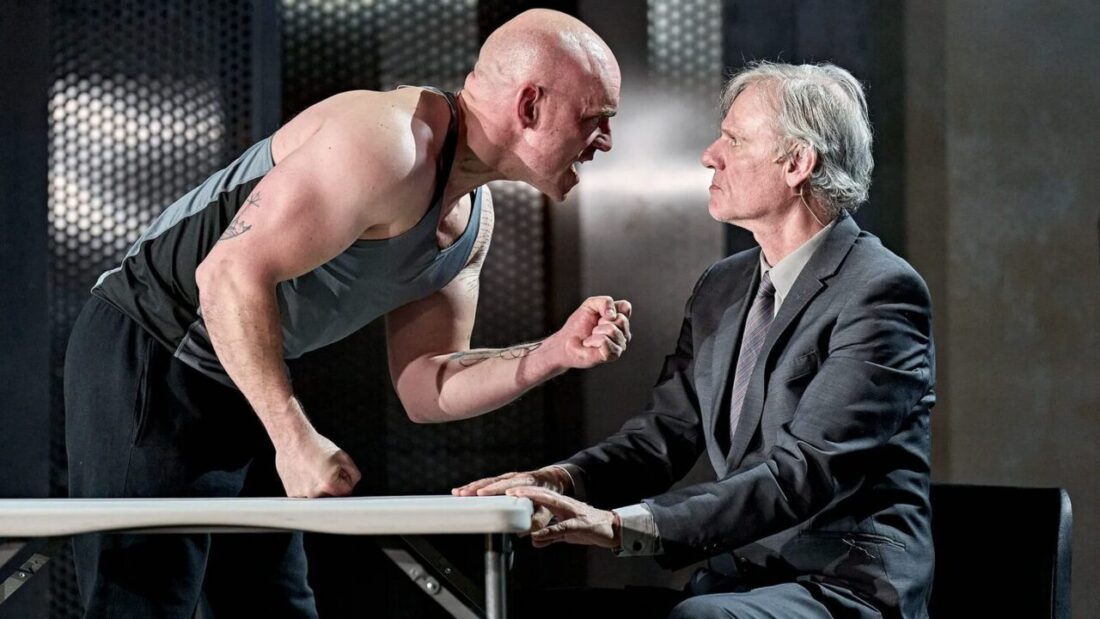

9 April 2025

With The Royal Court’s recent success Giant hoovering up awards left right and centre, transferring to the West End and with a Broadway run on the horizon, they must have felt the omens were similarly good for this gritty true-life drama, written and directed by wunderkind of British theatre, Robert Icke, hot-to-trot with his Olivier Award-winning Oedipus heading from the West End to New York this autumn. Canny commercial producer Sonia Friedman is attached as co-producer and production values are certainly high but it’s not a good play; it is overwrought, overwritten and muddled in its arguments and a real slog to sit through despite its brisk running time. I’d be genuinely surprised to see a West End transfer from Sloane Square.
It centres on Raoul Moat, a violent alpha male, a steroid-abusing former nightclub bouncer with a pathological hatred of Northumbria police following a lifetime of minor criminality and brushes with the law. Coming out of prison in 2010, he achieved notoriety – his 15 minutes of infamy – when he went on a murderous rampage with a sawn-off shotgun, his actions briefly making front page headlines, wall to wall TV news coverage and Facebook groups proclaiming him a folk hero. Moat sought out and shot his ex partner and her new boyfriend (who later died of his injuries) then blasted an innocent traffic cop sitting in his car in a lay by at point blank range, blinding him and ultimately leading to the poor man’s suicide after he lost his career and his marriage broke down.
A huge manhunt followed with Moat and two clownish buffoon friends camping out in nearby woods, survival expert Ray Mears brought in as a survival consultant to track him down and the bizarre appearance of alcoholic ex England footballer Paul Gazza Gascoigne turning up with a six pack of lager trying to act as a negotiator.
Not an obvious subject matter for Icke, who has previously excelled at rewriting stage classics for modern times. He has given several interviews explaining that his motivation was to explore toxic masculinity and the cult of celebrity villainy in a media obsessed age. But despite a stunning central performance by Samuel Edward-Cook, dripping with icy menace, Icke’s script plays fast and loose with its intentions. and ultinately loses focus. Was Moat a product of a violent childhood, social deprivation, failed by society, or was he just a “callous murderer, full stop, end of story” as then-PM David Cameron put it?
Edward-Cook, nostrils flailing, the veins on his neck throbbing, dripping with sweat, frequently eyeballs the audience in quite an unnerving way, as he narrates Moat’s story. Stepping in and out of the action on Hildegard Bechtler’s stark set, whose thin mesh walls double as screens for overhead CCTV footage or blinding white-outs, he proves to be an unreliable narrator, given to florid flights of fancy and fantasy. Moat’s verbose detailing of an unhappy childhood, unheard cries for help and numerous instances of alleged police persecution ring hollow. He likens himself to Taxi Driver’s Travis Bickle but he’s little more than a thick thug with a gun.
The rest of the cast multi role play but none of their characters are painted as more than cyphers. One genuinely inspired piece of stagecraft, a blackout monologue when the blinded police officer gives vent to his darkest thoughts, overstays its welcome.
The grubby story of Raoul Moat is not a great tragedy and certainly doesn’t deserve this extravagant spotlight.
I would happily sit through Giant and James Graham’s far superior Punch, which also deals with toxic masculinity, again. But not Manhunt.